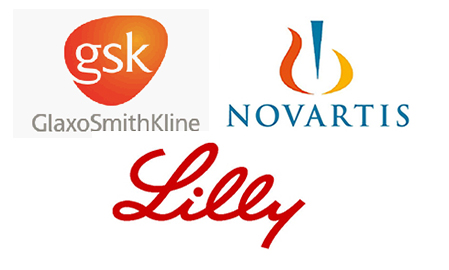Big Pharma triggered a major shift Tuesday with news of a multi-part swap and sale of assets among Novartis, GlaxoSmithKline and Eli Lilly.
In short: Glaxo is acquiring Novartis’s vaccines business for $7.1 billion, Novartis will buy GlaxoSmithKline’s oncology business for $14.5 billion, and Lilly—not Merck as has been rumored—is buying the Novartis animal health business. In addition, Novartis and GlaxoSmithKline are going into business together in a joint-venture consumer business of which GSK will be the major shareholder.
The respective deals are expected to wrap during the first half of 2015.
While the details have surfaced in a rush, the moves show a calculated hedge. Novartis, for example, has been polishing its oncology credentials for a while. Among its recent ventures in this direction are the February 18 announcement that it was buying up biotech CoStim Pharmaceuticals, a move that helped fill out its immune-oncology portfolio, particularly among PD-1s. This is in addition to developing what analysts consider a formidable competitor to Pfizer’s experimental cancer drug Palbociclib. The company also indicated in a February discussion with Leerink that it was taking a hard look at its pharmaceutical business. CEO Joe Jimenez told Leerink at the time that he was going to trim what he described as a “relatively unconstrained budget in Pharma R&D.”
Tuesday’s news provides some context for that sentiment—Jefferies analyst Jeffrey Holford noted in his analysis that by trading in its vaccines business for GSK’s oncology venture, Novartis will be able to focus on its “key franchise in pharmaceuticals, Alcon and Sandoz,” while “disposing of its loss-making vaccines business.” Leerink’s Seamus Fernandez wrote in a Tuesday research note that the swap gives Novartis the chance to “possibly reconsider pursuit of certain R&D efforts behind unapproved products.” The purchase will also move properties, including GlaxoSmithKline’s leukemia drug Arzerra and melanoma drug Mekinist under the Novartis logo. GSK keeps rights to Arzerra outside of oncology indications.
In exchange, Glaxo will pick up all Novartis vaccines, with the exception of flu vaccines—a list that includes the meningitis vaccines Bexsero and Menveo. Jefferies Holford called the cancer-for-vaccines swap a GSK distraction “from the issues in its respiratory business,” such as competition to its Advair medication, whereas Leerink’s Fernandez indicated that the move will put greater pressure on Glaxo’s recent respiratory drugs Anoro and Breo. Fernandez said that the swap gives Glaxo a way out of “the increasingly fragmented and crowded oncology markets.”
GlaxoSmithKline said in a statement that the deal will allow the company to introduce the Novartis vaccine portfolio in “high growth emerging markets” it had not reached and that the deal creates a vaccines business that has more than 20 items in development.
GSK says the deal means 70% of the company’s business will now come from four businesses: respiratory, HIV, vaccines and consumer healthcare, with pharmaceuticals accounting for 62% of the new GSK’s sales, vaccines 14%, and consumer health 24%.
The focus narrative has been an ongoing one, and as expansive as today’s news is, it is very much of a piece with Bristol-Myers Squibb’s 2013 strategy which included divesting itself of its diabetes business and Merck’s October decision to limit its focus to vaccines, oncology, diabetes and acute care.
The new GSK-Novartis consumer business is also a part-answer to rumors that while Merck was going to pick up Novartis’ animal health business, Novartis was going to take Merck’s consumer portfolio. Instead, GSK and Novartis have agreed to be partners, with GSK controlling 63.5% of the joint venture which will be called GSK Consumer Healthcare. The deal gives GSK Novartis’s OTC manufacturing network, in addition to products including Triaminic, Theraflu, Excedrin and Maalox.
The deal is an all-or-nothing arrangement: the announcement notes that the deal has to go through as a whole, otherwise all bets are off.







